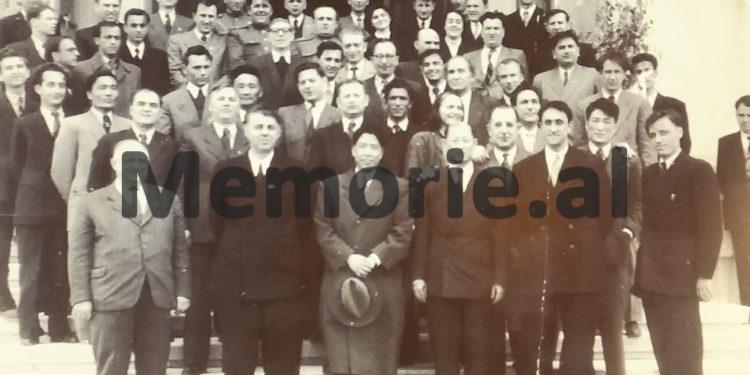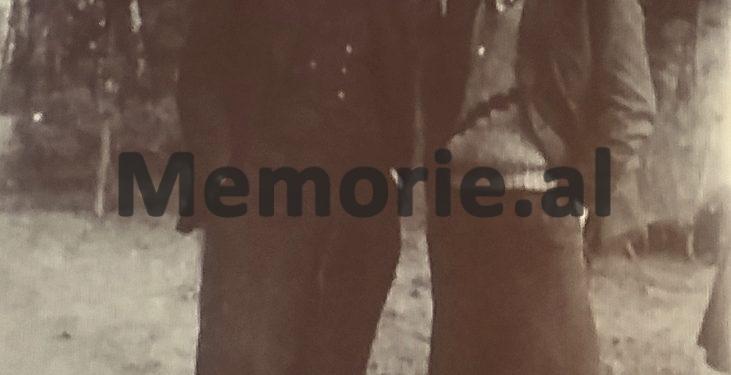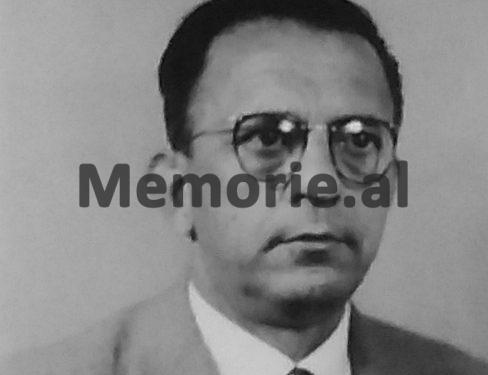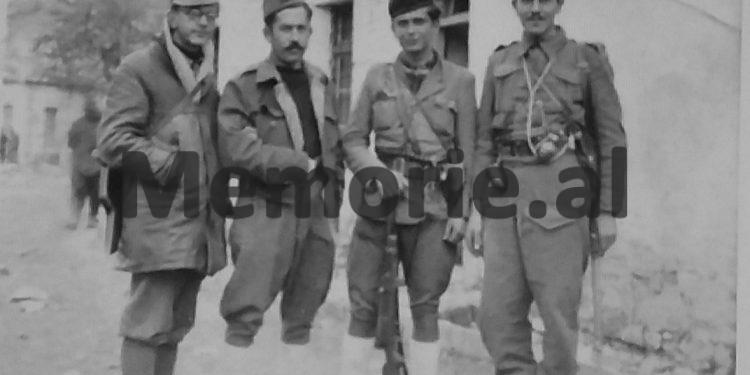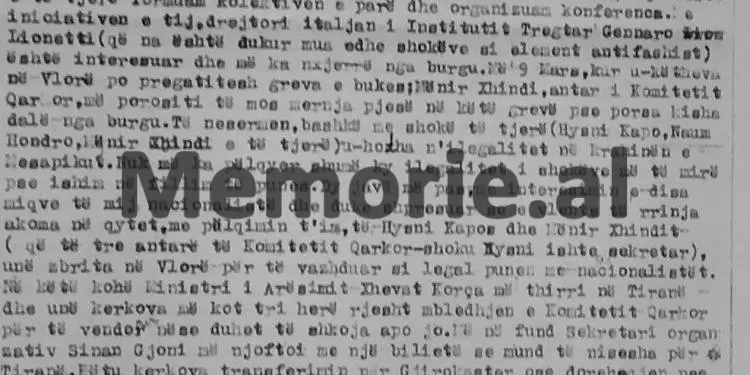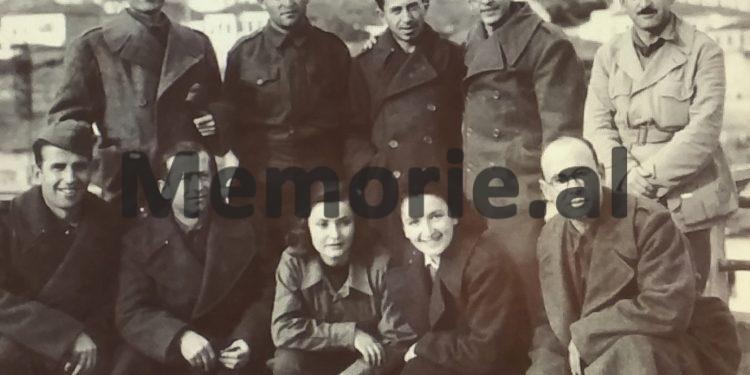Dashnor Kaloçi
Second part
Memorie.al publishes the unknown story of Shemsi Totozan, originally from Delvina, educated first at the French Lyceum of Korça and then at the University of Strasbourg in France, where he studied for several years for Literature, but was unable to finish know them, after he was forced to return to Albania, for health reasons, and start working as a teacher in the city of Gjirokastra and then in Tregtare e Vlora, where he had students Hysni Kapo and came into contact with the ideas for the first time communist, becoming active with the “Youth Group” headed by Sadik Premtja. The story of Totozan according to the autobiography that he left written, as well as the testimonies of his son, since: engagement in the Anti-Fascist Movement as one of the main cadres of the War in the South of Albania, the conflicts with Milad Popovici, the arrest by the Italians and the detention the prison of Tirana, the mission to Greece sent by the Communist Party, the assignment to the General Staff of Enver Hoxha, the appointment after the end of the War, as Secretary General of the Ministry of Education, the conflicts and the beating by Koci Xoxe, as an “enemy”, rehabilitation and being sent in 1953 as Albania’s ambassador to Paris, transferring to Sofia and returning to Albania, due to the beating and punishment of his brother-in-law, Bedri Spahi, the appointment and work as Director of the National Library, where he was intercepted by the Security with relevant devices , the conversations with his close friends against Enver Hoxha, until his arrest and sentence as an “enemy of the people”, with ten years in prison, and then exile in Belsh i Elbasan, from where he was released only in 1990, when he passed away without seeing the collapse of the communist regime.
Continues from last issue
First strike in 1945
Regarding that period of time when the first attack on him began, in his memoirs, Shemsiu states, among others: “After the liberation, I was the Secretary of the Cell in the Ministry of Education and in 1945 a member of the Committees of Departments this Committee, where the First Secretary was comrade Teodor Heba and the Second Secretary, comrade Kahreman Ylli, the three of us have often raised verbal and written reports on issues that did not seem fair to us some advice from Pandi Kristos and finally, deliberately, the heads of the Ministry of the Interior ordered the three of us to be separated from each other. Comrade Teodor was transferred to Durrës, as the First Secretary of the Party, and Comrade Kahreman, went to Minister in Paris. I rose in a close active Party, the lack of democracy in the Party, the lack of criticism and self-criticism, the issue of fear of Party members to address the problem, the issue of deputies Riza Dani and Selaudin T oto in 1945. I put these directly to Koci Xoxes, who did not call them rights. It is understood that after these came consecutive blows for me. In October 1946, I was taken to the Ministry of Justice as General Secretary, and in December 1956, I was sent as Director of the “17 November” Pedagogical School. No reason was given me for this treatment, and no strong reason I could find in myself. The District Committee of Tirana removed “serious remarks with a warning in my biography”, for the reason that: “I had spoken against the cooperatives”, “I had gone against the decisions of the District Committee”. Since that date, I have been looked down upon everywhere, my name was mentioned everywhere in the various Party organizations, as an enemy and anti-Party element. Old friends did not dare to speak to me, slander about me was the order of the day, and at every meeting of the school’s basic organization, a delegate from the Region or the city would come to me to hit me, why I was “dangerous element”. Even the Ministry of Education, on its side, tries to hit me. These persecutions against me continued until the 11th Plenum of the Central Committee,” says Totozan’s memoirs, regarding the years 1945-1947, when he was attacked by the Party as an “enemy”. Likewise, for that period, he also testified Selfixhe Broja (Ciu) who, among other things, recalled: “In a Party activity, Shemsiu raised the issue of the lack of democracy in the Party, which caused fear to raise issues that seemed wrong, such as, “The Trial of Deputies”. After that, the attack on him began, being slandered by the most unscrupulous. At that time, he was forced and addressed a memo to Dicastery, raising not only his problem, but also the dead end the Party had entered,” Selfixe, the former publicist of the 1930s, recalled about Totozan. Broja, who in the first post-war years worked with him in the Ministry of Education,.
Ambassador to France
The attack on Shemsi continued until the end of 1948, when the 11th Plenum was held, which is also known as the “Turn of the Party”. At that time, Enver Hoxha, according to the instructions he received from Moscow, hit Koci Xoxen, whom he saw as his rival at the head of the Party, and blamed him for all the “mistakes” that had been made. At that time, a very large number of communists were rehabilitated, who were considered “anti-party elements and enemies”, and in that framework, Shemsi Totozani was also rehabilitated, who was initially appointed Director of Education in the Ministry. He refused to start work without first clarifying his position and asked for a meeting with Tuk Yakova, who at that time held the position of Second Secretary of the Central Committee. In that meeting with Tuku, in addition to personal issues, he also raised other problems that seriously compromised democracy in the Party, which Tuku not only welcomed, but also helped him, proposing him to be the ambassador of Albania in Paris. Thus, in 1953, Shemsi Totozani went to France, as ambassador, and some of his former colleagues at that time testify that Totozani was one of the most dignified representatives of Albania in Paris. One of Totozan’s colleagues says that: during the presentation of credentials and after the ceremony, the President of France, Charles De Gaulle, was completely surprised and amazed by the French language (which Shemsiu spoke quite fluently, just like Albanian) and its broad culture. From the first moments of that meeting, the French President expressed himself to Totozan, saying that: of all the ambassadors accredited to France, that he had the kindness to receive, none of them spoke French in that way. Regarding the period that Shemsiu served in the Albanian embassy in Paris, Selfixhe Broja testified: “With the culture, education and insight that characterized Shemsiu, he was represented in the most dignified way in all diplomatic circles in Paris. But at that time he there were many problems, which came as a result of the lack of reconciliation with the cadre, who had dual subordinates and especially the barricade he made of financial waste and questionable expenses, which Llambi Peçini (Chief of Intelligence, near that embassy) did which at that time had complete independence. Shemsiu spoke openly against the incalculable financial expenses for the subsidy that was given at that time to the Marxists, whom he called with disgust: “Horrats of Europe”. But the denunciation that Shemsiu made to them those problems in the Albanian embassy in Paris, created numerous consequences in Tirana, attacking him personally with Enver Hoxha, who had also signed the financing for the Marxist groups- Leninists, who were regularly paid twice a month by the Albanian embassies in Paris and Rome”.
The shot after Bedri Spahi
That rift that was created between Totozan and Enver Hoxha, at the time when he was ambassador in Paris, also coincided with the blow that Enver gave Bedri Spahi, the bachanak of Shemsi. After that, Enver Hoxha removed Shemsi from France and initially sent him as ambassador to Sofia, Bulgaria, a transfer which meant a very bleak future for him. Regarding this, Shemsi’s son, Vojo Totozani, testifies: “At the time Bedri Spahiu was hit, Enver Hoxha called all the ambassadors of Albania to Tirana, in order to explain to them the reasons for his dismissal from all functions party and state. At that time, the father was in a meeting in Geneva and when he came to Tirana, Enver communicated the transfer from Paris to the Albanian embassy in Sofia. During an official party at that time, when it was his turn to meet the ambassadors, Enver Hoxha demonstratively passed Shemsi without shaking his hand. The main reason for that transfer and stay was due to the beating of Bedri Spahi, whose wife was our mother’s sister, and that movement was the genesis of the severe blow that the father would suffer later, because he was also removed from Bulgaria and brought to Tirana. After leaving him for almost two years as a clerk in the Ministry of Foreign Affairs, there from 1957, he was also removed from there and appointed Director of The National Library, where he was constantly under the surveillance of the State Security bodies, which had set up surveillance on the office premises. Even under those conditions, the father worked with the greatest dedication, enriching the Library’s fund with books from the most selected, but even for that he encountered great obstacles and was accused from above of introducing reactionary ideology into the library. Extremely revolted by the situation he was in, the father occasionally vented his accumulated grievances with his closest friends, such as: Professor Eqerem Çabej, Selfixhe Broja, Zef Mala, Nonda Bulka, etc., to whom he told : ‘Woe to this people, who are denied spiritual and mental food’. In the same way with those friends of his, at that time the father also discussed the abuses and privileges of the senior leadership who lived in “Blok”. All this influenced his expulsion from the Party in 1956 and the motivation he was told then was:
- You have shown views foreign to the Party.
- You spoke out against friendship ties with China.
- In France you had connections with the enemies of the Nation.
- You propagated Western culture.
At the end of that meeting, where Faik Shehu was the delegate, the father said: ‘I am convinced that one day the Party will again accept me in its ranks’. Faik Shehi said to him: “Which party are you talking about, that of Enver Hoxha”? The father answered: “No, for the Party of Labor of Albania”. His attitude in the District Committee was very manly and he turned from the accused to the accuser”. This is also confirmed by Selfixhe Broja, who, among others, testifies: “After those accusations, when they told Shemsi to apologize to the Central Committee and denounce his comrades, he replied: My name is Shemsi Totozani and I have been all my life honest and will die like that”.
10 years in prison and exile in Belgium
After Shemsiu did not apologize and did not criticize himself, Enver Hoxha said: “Let him go to Elbasan, start over.” Regarding the period that he lived there and was subsequently arrested, his son Vojua testifies: “In the city of Elbasan, the father worked for some time as a teacher and in 1967 he retired as an educator. During that period until in 1974, when his father was arrested, he was constantly hanging out mainly with Qamil Çela, (the first communist in Albania), whom he had as his closest friend. Similarly, apart from Qamil, Ymer Dishnica, Peço Kagjini, Muhamer Spahiu and several other intellectuals such as Perikli Sheti, with whom we had family relations. Among the friends of Tirana, those who never forgot my father even when they took him to Elbasan, was Dalan Shapllo and his brothers. My father had a sense of humor extraordinary and with those friends and companions he would constantly sit in the café, where among other conversations they would also discuss Enver Hoxha.
Paraphrasing Victor Hugo in his poem about Napoleon the Third, the father kept saying to his comrades: ‘If there were 1,000 of his opponents left, one of them would be me, if there were 100 left, one of them would be if it were me, while if there was one opponent left, it would be me’. All this caused the father to be arrested in 1974 and after being held for six months in the investigator’s cell, he was sentenced to ten years in political prison and confiscation of property. At first, they wanted to convict Shemsi as a “UDB agent”, but after they could not find witnesses, they convicted him of “agitation and propaganda”. During the court hearings, the father turned into an accuser and that thing then had a big echo. Among those friends of the father who refused to give false testimony against him, were: Ferik Toto, Faik Çoçoli and Leonidha Qirjako, who also faced great pressure and serious consequences afterwards. Likewise, Qamil Çela, who refused to testify against his father, was cut off from his life pension. At the time when our father was sentenced, our mother Sidon, who was a communist of 1941, was expelled from the Party and fired from her job, asking her to account for why she was waiting at home for Bedri Spahi’s mother-in-law, who was also her mother her. The father spent his prison term mainly in the Ballsh camp and was released from there in 1982, taking advantage of the amnesty that was then granted to the elderly over 60 years old. After his release from prison, the father mostly stayed at home where he worked on the drafting of a French-Albanian Phraseological Dictionary, which he had started 10 years ago. That dictionary was confiscated by the investigators when they arrested him, thinking that it would contain compromising materials, and they gave it back to him later. But the father did not stay free for long, because in 1986, when he was 75 years old, he and his mother were deported from Elbasan to Belgium. In the town of Belshi, the father went crawling and held by the arms of the mother, because he was very sick. There Shemsiu remained in exile until November 1990, when the Internment-Deportation Commission was dissolved. During that time, the views of the communist dissident led the father to a complete ideo-political metamorphosis and he called Enver Hoxha “Traitor of the ideals of the War”. In November 1990, both with his mother returned to Elbasan, but due to the many sufferings of prison and exile, he did not live more than two months”, Vojo Totozani concludes his painful confession about his father his, Shemsiun, one of the honest and idealistic communists, who never agreed with the dictates of Enver Hoxha and as a result of his rebellion, suffered for 15 years in prisons and exiles./Memorie.al





